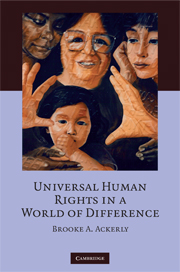Book contents
- Frontmatter
- Contents
- Acknowledgments
- 1 Universal human rights in a world of difference: challenging our thinking
- Part I Epistemology, diversity, and disagreement in theory and practice
- 2 Universal human rights?
- 3 Universalisms and differences
- 4 Immanent and universal human rights: more legitimate than reasonable
- Part II A methodology for immanent theory
- Part III Immanent universal human rights: theory and practice
- Bibliography
- Interviews
- Index
4 - Immanent and universal human rights: more legitimate than reasonable
Published online by Cambridge University Press: 06 July 2010
- Frontmatter
- Contents
- Acknowledgments
- 1 Universal human rights in a world of difference: challenging our thinking
- Part I Epistemology, diversity, and disagreement in theory and practice
- 2 Universal human rights?
- 3 Universalisms and differences
- 4 Immanent and universal human rights: more legitimate than reasonable
- Part II A methodology for immanent theory
- Part III Immanent universal human rights: theory and practice
- Bibliography
- Interviews
- Index
Summary
Introduction
When I was revising the preceding chapter and this one – arguably the most theoretically demanding chapters of this book – Marie and her family were called in for their refugee interviews. I wrote everyone I knew for advice on how to support her at this stage. One wrote back with expertise and confidence, “Uganda is not accepting Rwandan refugees any longer and is sending them back to the best of my knowledge.” Others encouraged me to write a supportive letter that would convey “‘personal knowledge’ of this family and their plight.” I used my past correspondence from her to reconstruct their life story since 1992.
Here was my opportunity to ignore structural injustices and to affect one injustice, to make one family's specific injustices visible. Would it matter? I reread her life history as it had unfolded to me in letters and emails in order to make visible to me and to the Ugandan judge why Marie was not a typical Rwandan refugee. Prior to the urgency of the letter, I had thought of her life experience as revealing to me circumstances that were not unique but that were invisible to international human rights discussions. Now, I wanted to read those same life experiences as evidence of the family's unique fear of persecution.
- Type
- Chapter
- Information
- Universal Human Rights in a World of Difference , pp. 91 - 124Publisher: Cambridge University PressPrint publication year: 2008



